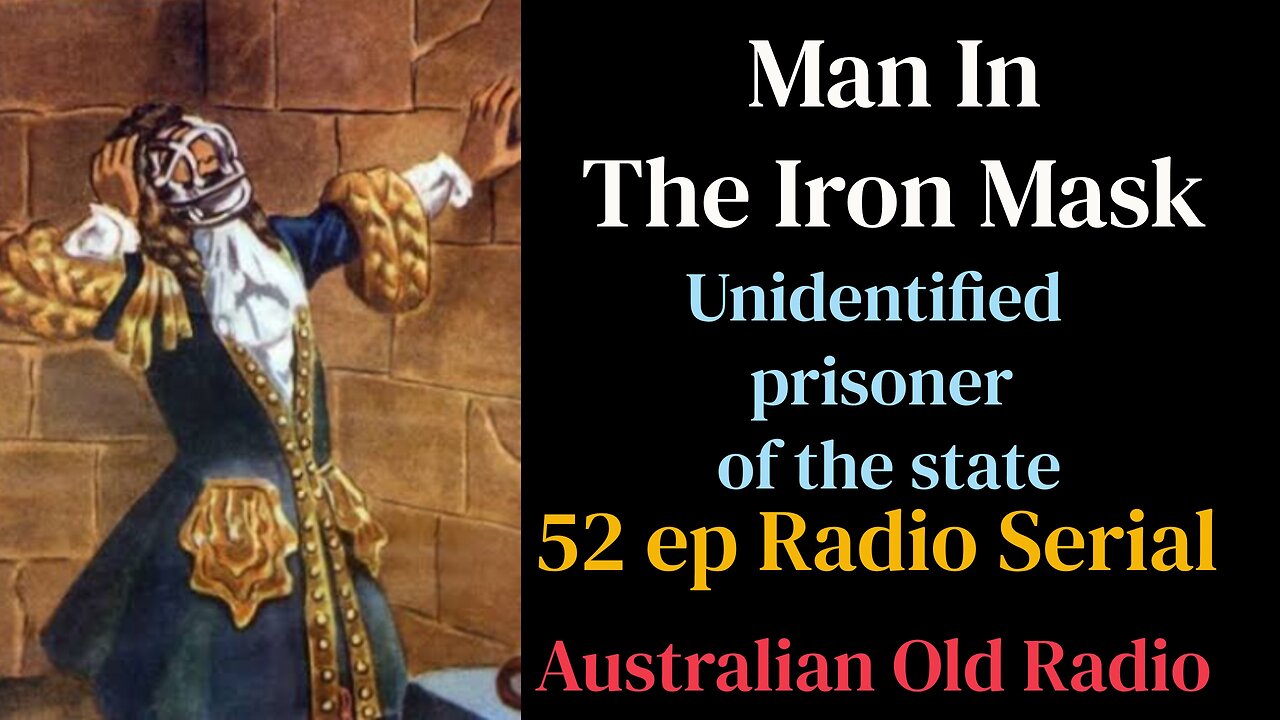Premium Only Content

Man in the Iron Mask | Radio Serial (eps 28-52)
The Man in the Iron Mask (French: L'Homme au Masque de Fer; died 19 November 1703) was an unidentified prisoner of state during the reign of King Louis XIV of France (1643–1715). Warranted for arrest on 28 July 1669 under the pseudonym of "Eustache Dauger", he was incarcerated on 24 August and held for 34 years in the custody of the same jailer, Bénigne Dauvergne de Saint-Mars, in four successive French prisons, including the Bastille. When he died there on 19 November 1703, his inhumation certificate bore the pseudonym of "Marchioly", leading several 19th century historians to conclude the prisoner was Italian diplomat Ercole Antonio Mattioli.
His true identity remains a mystery, even though it has been extensively debated by historians, and various theories have been expounded in numerous books, articles, poems, plays, and films. Among the oldest theories is one proposed by the French philosopher and writer Voltaire, who claimed in the second edition of his Questions sur l'Encyclopédie (1771) that the prisoner was an older, illegitimate brother of Louis XIV. This assertion of a royal connection was echoed later by authors who proposed variants of this aristocratic solution.
What little is known about the prisoner is based on contemporary documents that surfaced during the 19th century, mainly some of the correspondence between Saint-Mars and his superiors, in which the prisoner had been labelled "only a valet" shortly after his arrest. What emerges from these documents is that he was jailed for "what he had seen", "what he knew", and "what he was employed to do" before his arrest.
Legend has it that no one ever saw his face, as it was hidden by a mask of black velvet cloth, later misreported by Voltaire as an iron mask. Official documents reveal, however, that the prisoner was made to cover his face only when travelling between prisons after 1687, or when going to prayers within the Bastille in the final years of his incarceration; modern historians believe the latter measure was imposed by Saint-Mars solely to increase his own prestige at the end of his career, thus causing persistent rumours to circulate about this seemingly important prisoner.
In 1932, French historian Maurice Duvivier proposed that the prisoner was Eustache Dauger de Cavoye, a nobleman associated with several political scandals of the late 17th century. This solution, however, was disproved in 1953 when previously unpublished family letters were discovered by another French historian, Georges Mongrédien, who concluded that the enigma remained unsolved owing to the lack of reliable historical documents about the prisoner's identity and the cause of his long incarceration.
-
 17:07
17:07
Fit'n Fire
1 day ago $4.94 earnedThe IMBEL FAL 7.62x51mm Battle Rifle
17.1K1 -
 54:12
54:12
Uncommon Sense In Current Times
17 hours ago $7.92 earned"Neither Batman nor the Good Samaritan: A Christian View Of Self-Defense in the Daniel Penny Case"
13.6K3 -
 59:57
59:57
The Tom Renz Show
18 hours ago"Health and Health freedom - next steps"
7.78K3 -
 39:40
39:40
PMG
15 hours ago $7.15 earned"Paulo Figueiredo, Mehek Cooke, Ashley Hayek, Mark Mitchell- The Breanna Morello Show"
35.2K4 -
 3:37:41
3:37:41
Fresh and Fit
7 hours agoGirls React To Lily Philips Sleeping With 100 Guys
125K57 -
 27:00
27:00
Stephen Gardner
10 hours ago🔥McConnell ATTACKS Trump | HUGE Update on MILITARY DRONES mission!!
109K147 -
 8:10:03
8:10:03
Dr Disrespect
18 hours ago🔴LIVE - DR DISRESPECT - WARZONE - HUNTING SEASON
259K77 -
 1:32:28
1:32:28
Fresh and Fit
11 hours agoHow To Wholesale and Fix & Flip Real Estate!
71.5K11 -
 1:30:55
1:30:55
Flyover Conservatives
1 day agoDrones, Darkness, and Divine Intervention: Unpacking Prophecy and Reality - Dr. Troy Spurrill | FOC Show
44.3K2 -
 59:32
59:32
The StoneZONE with Roger Stone
10 hours agoHonoring Great American Patriots for Helping to Save our Country | The StoneZONE w/ Roger Stone
95.4K8